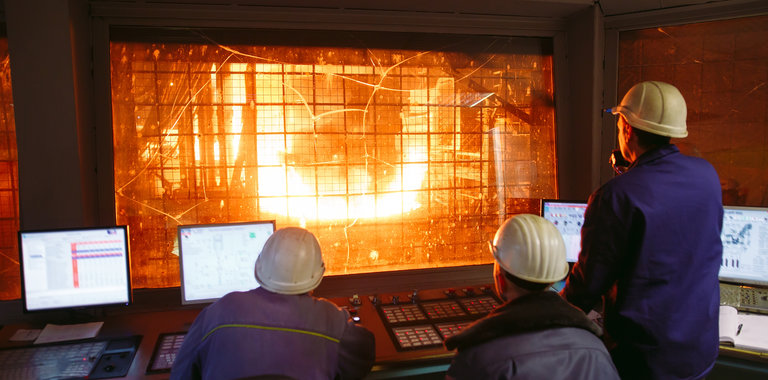
How Metal Manufacturers Are Enhancing Productivity & Profitability
Real-world success story: A large steel manufacturer implemented a modern DCS, leveraging IoT applications and advanced analytics.Within one year, the manufacturer realized US $14 million in savings.As a result, the company is expanding automation capabilities by connecting across different facilities, IT systems and workers to collect and analyze data for additional optimization and increased product quality. New areas to be addressed include schedule challenges, defect recognition, quality assurance, and environmental impact.
This example can help all types and sizes of metal manufacturers. The razor-thin profit margins typical in metal manufacturing often limit technology investments. However, competitive pressures and real-world proof points like the one above are creating a sea change within the metal manufacturing industry.
The urgent call to action for metal manufacturers is an upgrade to modern DCS and Safety Systems as the next vital step in the advanced automation journey. Read on to learn why.
It's hard to imagine a world without steel and other metals. Society relies on metal for many foundational needs, such as infrastructure, vehicles, and appliances. It is in our collective best interest to bolster and support the metal industry. Currently, however, metal manufacturers are facing multiple pressure points; and these global forces demand change.
具体来说,升级成本,更意外的道ntime, and steep emissions management requirements threaten already thin margins. That’s because many processes in metal manufacturing are out of alignment with operational requirements. Central to addressing these challenges is upgrading the hub of metal manufacturing environments: the Distributed Control System (DCS) and Safety System.
Why is a modern DCS so important?Simply put, a legacy DCS can inhibit productivity. One single overlooked issue can escalate to multiple issues and incur significantly higher costs – and unnecessarily so. While the time and investment to modernize is never easy, the risk of delaying a modern DCS upgrade is even riskier and one that metal manufacturing companies simply cannot afford to take.
For metal manufacturers that delay even further, this risk will grow and could threaten future viability. The adoption of 4IR (Industry 4.0) digital and automation solutions – such as Artificial Intelligence and Machine Learning (AI/ML) – are essential to achieve next-level operational outcomes and remain competitive. These solutions must integrate with the DCS and Safety systems. Legacy systems are, for the most part, unable to achieve 4IR integration.
The adage, “what got you here, won’t get you there” says it best. Metal manufacturers, it’s time to modernize your DCS and Safety systems.
Across all geographies, metal types, and company sizes, no metal manufacturing company is exempt from this call to action. And, many are already starting on the journey to adopt advanced DCS capabilities. In interviews with 20 leading metal companies from around the world, 88% said they are committed to updating (or have already) their DCS. A mere 12% currently have no plans to do so. The time to change is now. Due to the sophistication of technology and advanced automation, this is not a journey where “catching up” will be easy – and may not be possible at all.
DCS is an ideal enabler to digitization for metal manufacturers. First, it can generate immediate and short-term returns, which helps to justify and fund the on-going technology journey to 4IR. Second, it establishes the proper foundation for technology integrations and expanded scale as advanced automation capabilities are implemented.
Why does integration matter?The integration of networks into a single pane of glass allows operation-wide optimization and control. This is where a modern DCS really shines, leveraging an intuitive HMI (human machine interface) and combining data from the DCS with domain expertise, other applications, and AI/ML. In turn, the DCS enables predictive capabilities and the actionable insights upon which improved productivity, profitability, and safety are built.
The benefits offered by a DCS in metal manufacturing are transformational and include:
DCS Benefit:Improves process monitoring
- Impact in metal manufacturing environments:Aids in process monitoring and(both locally and remotely) continuous elimination of emission gas and moisture from coke oven gas, radiation monitoring, etc.
DCS Benefit:Oversees complex operations
- Impact in metal manufacturing environments:Helps in controlling complicated, large-scale processes such as the basic oxygen furnace process, melting scrap metal in an electric furnace, and refining metal by removing impurities.
DCS Benefit:Promotes process efficiency
- Impact in metal manufacturing environments:Assists controllers and production managers in checking the status of production processes, simplifies decision-making, and allows access to operating conditions for new production of repeated grades.
DCS Benefit:Enhances component lifecycle
- Impact in metal manufacturing environments:Provides flexibility and extends component life through advanced technology, from ore handling to loading of finished products.
DCS Benefit:Mitigates risks
- Impact in metal manufacturing environments:Initiates automatic shutdowns in case predetermined thresholds are breached.
This impressive and realistic list of benefits, many of which are especially helpful in metal manufacturing environments, helps justify the decision to upgrade DCS and Safety systems. Given the current and growing pressures on metal manufacturers, this call to action should be a welcome one that mitigates risks and protects future viability. To help justify the investment to upgrade, there are financing options that provide CapEx and OpEx based approaches to help create a faster and more seamless approval process.
In metal manufacturing environments, it’s time to upgrade to modern DCS and Safety Systems. This is the only way to ensure a viable future and boost productivity while protecting profits.
Please reach out if you’d like to discuss your specific manufacturing needs and a modern, next-generation DCS and Safety System upgrade.

